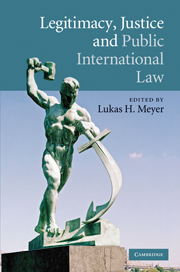Book contents
- Frontmatter
- Contents
- List of contributors
- Acknowledgements
- Introduction: Legitimacy, justice and public international law. Three perspectives on the debate
- 1 The legitimacy of global governance institutions
- 2 Institutionalising global demoi-cracy
- 3 The responsibilities and legitimacy of economic international institutions
- 4 Do international organisations play favourites? An impartialist account
- 5 ‘Victors’ justice'? Historic injustice and the legitimacy of international law
- 6 International law and global justice
- 7 Global justice: Problems of a cosmopolitan account
- 8 The responsibility to protect human rights
- 9 The threat of violence and of new military force as a challenge to international public law
- 10 Forcing a people to be free
- Index
- References
2 - Institutionalising global demoi-cracy
Published online by Cambridge University Press: 03 May 2010
- Frontmatter
- Contents
- List of contributors
- Acknowledgements
- Introduction: Legitimacy, justice and public international law. Three perspectives on the debate
- 1 The legitimacy of global governance institutions
- 2 Institutionalising global demoi-cracy
- 3 The responsibilities and legitimacy of economic international institutions
- 4 Do international organisations play favourites? An impartialist account
- 5 ‘Victors’ justice'? Historic injustice and the legitimacy of international law
- 6 International law and global justice
- 7 Global justice: Problems of a cosmopolitan account
- 8 The responsibility to protect human rights
- 9 The threat of violence and of new military force as a challenge to international public law
- 10 Forcing a people to be free
- Index
- References
Summary
Introduction
Over the last few years, international institutional reform has become a major concern among international lawyers. They are not alone in addressing the issue, however. Global justice theorists have also started focusing on the crucial institutional dimension of global justice. So doing, they have gradually developed normative criteria to guide reform of international institutions. Interestingly, some of them have also emphasised the need to pay heed to existing institutional structures and to factor those into any valuable normative reflection on the design of future global institutions. It is such a dynamic and reflexive approach to institutionalising global institutions which I would like to adopt in this chapter, starting from normative requirements, confronting them to institutional reality and, finally, returning to our normative starting point to rethink it through and produce a normative proposal that is both critical and feasible.
That method will be used in the chapter to discuss a specific issue underlying and somehow conditioning all current projects of international institutional reform: global democracy. Although the theorising of democracy beyond the state has been at work for quite some time now, first in the context of the European Union and more recently at the international level, most publicised projects fall short of an institutional proposal, i.e. of an account of how to turn their normative proposal into a plausible institutional structure.
- Type
- Chapter
- Information
- Legitimacy, Justice and Public International Law , pp. 58 - 91Publisher: Cambridge University PressPrint publication year: 2009
References
- 10
- Cited by



